
After his father spoke to the then king, Mahendra at a cocktail party, the king immediately called his assistant and said that foreign tourists should get visas at the airport. From that day on, the new visa rules began
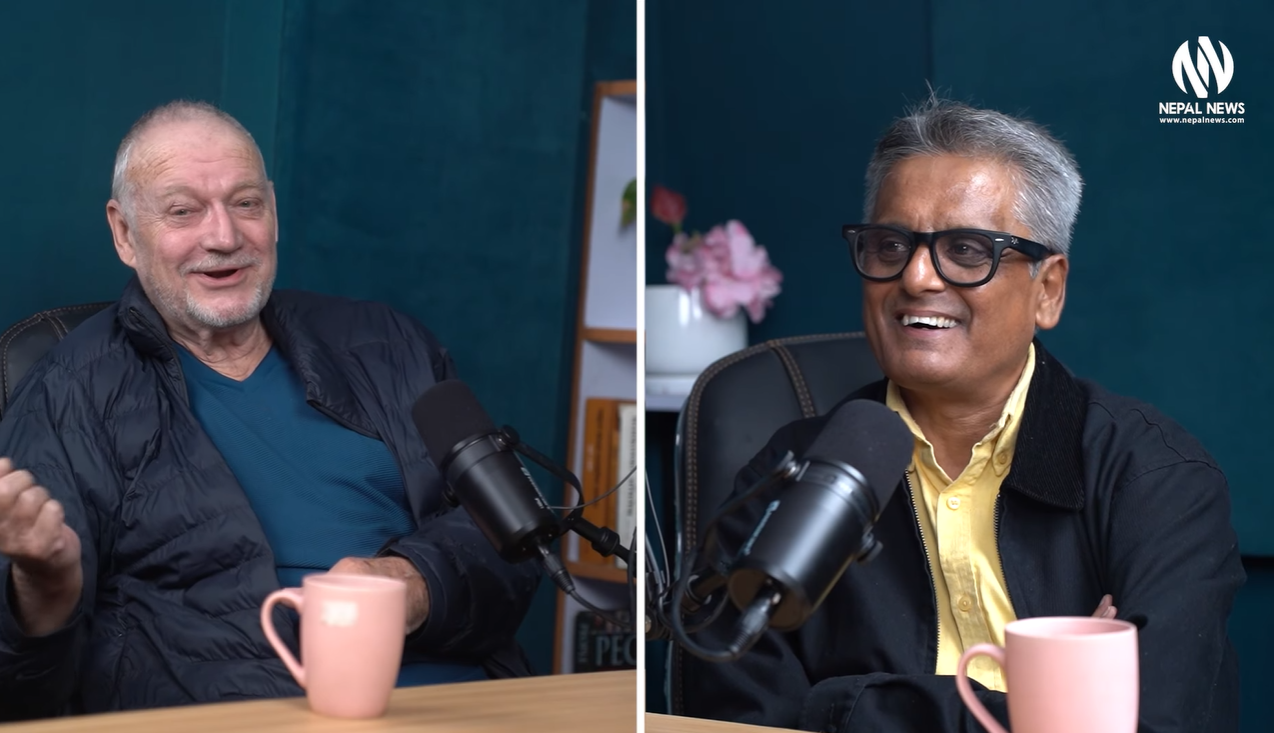
KATHMANDU: Boris Lissanevitch (October 4, 1905–October 20, 1985) is associated with various identities: ballet dancer, hotel entrepreneur, and tourism pioneer, among others. But his identity in Nepal is deeper and historical. Having escaped the Russian Revolution and travelled through various countries, he arrived in Nepal in the 1950s and ran a restaurant and hotel business. He is considered Nepal’s ‘Grandfather of Tourism.’ He was the one who started bringing tourists to Nepal collectively.
Boris, who introduced various types of fruits, vegetables, and handicrafts to Nepal, is the founder of Nepal’s first hotel, the ‘Royal Hotel.’ Later, he started the Yak & Yeti Bar, which expanded into a hotel. He had a close relationship with leaders from King Tribhuvan to King Mahendra. He lived in Nepal with his family and passed away in Kathmandu at the age of 80 years.
Boris’s son, Michael Lissanevitch, has also spent a long time in Nepal. Michael, who once operated the Sangha Mitra Restaurant in Thamel, is active in writing, the hotel business, and spirituality.
Edited excerpts from an interview by Nepal News Editor-in-Chief Prashant Aryal with Michael, son of Boris, discussing his father’s connection to Nepal:
Let’s start the conversation with reference to your father, Boris Lissanevitch. How would you introduce him to the Nepali people?
Many people knew my father by the name Boris. They never called him Lissanevitch. The older generation recognized him immediately when they heard Boris, but that is not enough for the current generation. It was my father who started tourism in Nepal. He is also called the Grandfather of Tourism. He introduced many things to Nepal, including various types of fruits, vegetables, and handicrafts.
He was the one who started the Royal Hotel, Nepal’s first hotel, right?
Yes. I think the Royal Hotel must have opened in 1954/55. We arrived in Nepal in 1951. We lived in Satya Bhawan. After that, my father started the Royal Hotel in Bahadur Bhawan (currently where the Election Commission’s Office is located).
What was the atmosphere of the Royal Hotel like at that time? What things do you remember?
On one side of the Royal Hotel’s garden, there were many animals. Hunters would bring animals from the mountains, and my father and I loved that very much. There were deer all over the garden. My mother kept a mongoose. There was also a panda. In the back garden, there were two Himalayan bears raised since childhood, which my grandmother looked after. You could say it was a small zoo.
Mainly, the Yak & Yeti Bar there was famous. Many celebrities, Hollywood stars, and many other people used to come there. There were many stories in the Yak & Yeti Bar. Later, that Yak & Yeti became a restaurant and then a hotel. However, since I was young, I don’t know many stories from there.
Mountaineering leaders also used to come. They would spread all their gear out in the big garden in front and check if their equipment was alright.
My parents’ flat was in an apartment above the hotel. It wasn’t easy to convert an old palace into a hotel. Everything was old. Some materials for services like toilets had to be brought from India. Not many vehicles ran on the Tribhuvan Highway, so some items like bathtubs had to be carried by people. The Royal Hotel was very ‘unique.’ It had a separate charm.
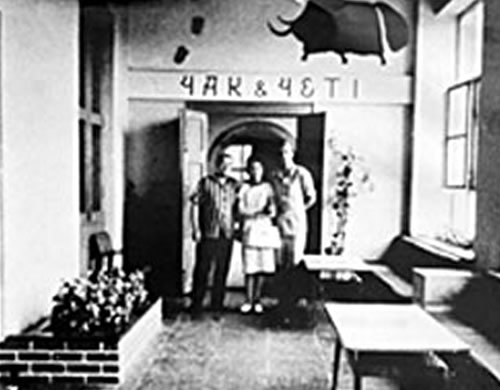
In 1969, the Hotel Royal closed and Boris established the Yak & Yeti Restaurant and Hotel
Do you remember the names of the celebrities who came to the hotel?
There were many, including Edmund Hillary and John Bishop from the Himalayan Expedition, and celebrities like French star Jean-Paul Charles Belmondo and British star actress Vivien Leigh. The then King and Queen of Spain also came for their honeymoon. At that time, there weren’t many other places to stay in Kathmandu, so the Royal Hotel was the first choice.
If any celebrity wanted to play tennis, they needed a partner. My father would send me. For example, there’s an interesting anecdote involving Belmondo. When my father sent me to play tennis with Belmondo, he looked at me and asked my father, “Play with this kid?”
When the game was over, Belmondo went to my father and said, “This kid plays quite well. He actually defeated me.”
British Queen Elizabeth and Prince Philip, and later foreign guests who came for the visit of Jawaharlal Nehru and King Mahendra’s coronation, were all hosted by Boris, right?
Yes, there were no other people who had that much experience. Not only experience, but at that time, supplies were lacking, so things had to be ordered and improved. Ice was ordered from India by plane, but by the time it arrived, it had all melted.
A camp was set up for hundreds of people in the jungle. My father took the lead in the feasts organized at Singha Durbar, Lal Durbar, and Sheetal Niwas, which was a huge task. But my father absolutely loved such challenges. Whatever he put his hands on, he had to do that job well.
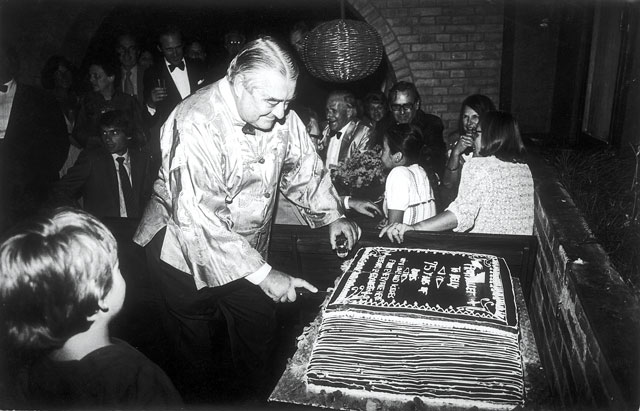
Boris cutting cake on his 75th birthday
It is said that out of 6,000 chickens brought, 3,000 had died. How did he manage?
I don’t know the detailed story. But my father was an expert in arranging alternatives if something or anything was not available. Some guests were vegetarian, and among the meat-eaters, some wanted one kind of meat and others wanted another. The waiters also had to be trained. He knew everything about how to serve or not serve what to whom. An amazing person! His life is very interesting, and it is also written about in the book Tiger for Breakfast by Michel Peissel.
You mentioned bringing goods from India. The Royal Hotel also had a bakery; were the ovens brought from India?
No, the ovens were made right here. Brick ovens were made. My father was also the first to start making bread and cake in Nepal. The people from Krishna Pauroti learned it right there.
Which foods did Boris introduce to Nepal for the first time?
In vegetables and fruits: mushrooms, beetroot, broccoli, and strawberries, among others. There must be more information about this in the book. The Royal Hotel had a big garden, and many kinds of vegetables were also planted there. Gradually, other people also started learning from it.
He was the first to bring tourists to Nepal collectively. It is said that visas were granted through his initiative for tourists coming in groups. What is the story?
King Mahendra was also present at a cocktail party at the Royal Hotel. My father got a chance to talk to him closely. My father suggested that Nepal attracts tourists, so why not bring them in?
At that same party, the king called his assistant and said that from the next day, any foreign tourist coming to Nepal should receive a visa at the airport. The new visa rule started that very day. Whether my father brought the first group or not, groups of tourists would send him telegrams.
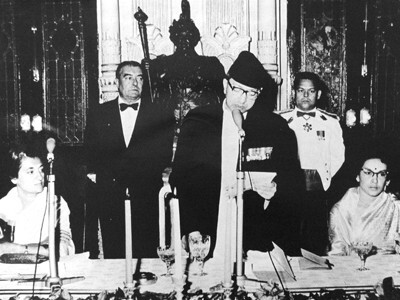
Boris with King Mahendra, Queen Ratna, and Indira Gandhi during Indian Prime Minister Jawaharlal Nehru’s visit to Nepal. Photo: ESC.com.np
The Yak & Yeti Bar was frequented by all kinds of people, from Nepal’s ‘Who’s Who’ to diplomatic missions, right?
Prince Basundhara Bir Bikram Shah used to come. Ambassadors and pilots were also all there. There was talk that some pilots would be at the Yak & Yeti Bar at night, and then their plane would crash the next day. Three or four regular pilots died that way.
At that time, a helicopter also crashed. A DC-3 plane also ‘crashed.’ I mean, that bar was like a news center. Everyone would get information about what was happening right there.
Your father was a hotelier and a tourism entrepreneur, but also a hunter, right? He hunted a lot in the forests of Nepal and India.
He hunted a lot while he was in India. He would kill man-eating tigers and leopards. My father would go after man-eating tigers. Man-eaters are very dangerous; my father killed five or six of them. He had a good friendship with the Maharajas of India. They would invite my father for hunting.
When I was young, he took me tiger hunting for my birthday. We sat on a lookout platform all night, with a dead buffalo placed below. We waited all night with guns, expecting the tiger to come eat the buffalo. Maybe it smelled us! We only heard the sound of the tiger from afar; the tiger didn’t come.
I was 13 years old at that time. This happened in Chitwan. I killed a deer. I even have a photo of a 13-year-old boy standing with his foot on the body of the deer with a gun.
Boris was born in the then Russia (now Ukraine). After the Russian Revolution started, he fled from there and came to Paris. He was also a good ballet dancer, and while performing ballet, he came to Calcutta (now Kolkata) via Latin America, North America, Europe, and East Asia, right?
Yes. Not just ballet dance, he created his own dance style. At that time, the dances that were popular, such as dances from modern cities, he would mix with ballet and present new styles of dance. He presented them in Bali, East Asia, Hong Kong, and many other places with his first wife, the ballerina Kira Shcherbacheva. Let’s say the two of them were ‘Dancers of the Time.’ During that time, he arrived in Calcutta and also performed dance there. The pair of Boris and Kira was very famous in Calcutta. A little later, my father started the 300 Club in Calcutta.
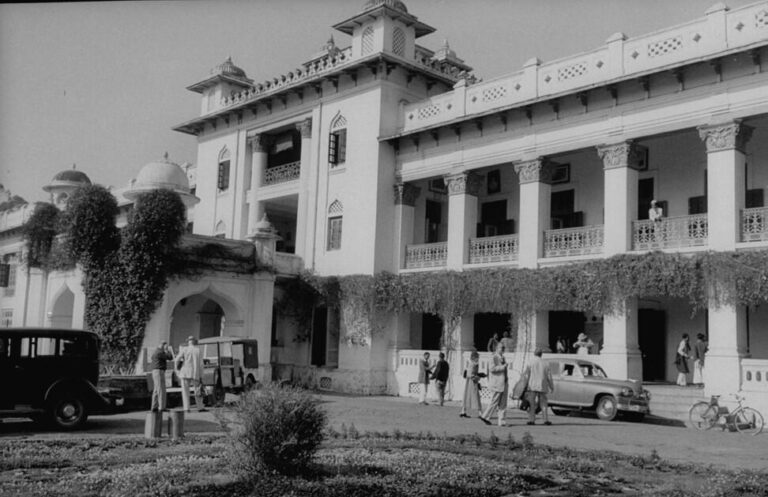
Royal Hotel
That club was also for the very elite and ‘Who’s Who,’ right?
That club was open to everyone. Other clubs were attended only by foreigners or only Indians. The 300 Club was the first club where both foreigners and Indians participated. Everyone from Maharajas to ambassadors used to come. A war was also going on at that time. Army personnel and pilots also used to come.
After 1947, when the Government of India started controlling alcohol, the club gradually weakened. After that, Boris came to Nepal, right?
Yes. King Tribhuvan had gone to seek India’s help. My father met King Tribhuvan at the 300 Club. The secret meetings with Tribhuvan used to take place in my father’s apartment above the club.
After receiving India’s support, Tribhuvan became king again. After that, he sent an invitation to my father to come to Nepal, saying to come and see Nepal. That’s how my father came for the first time.
After King Tribhuvan invited him, Boris initially tried to open a liquor distillery in Nepal, right?
He started a liquor distillery. The idea was very good, and the liquor was also good. But the main problem at that time was that people used to make and sell liquor at their own homes, and after the distillery opened, the business of those selling homemade liquor dried up. After that, people started feeling jealous and trying to frame my father. New rules were made by the tax office, and heavy taxes were imposed. When my father could not pay the tax, he was arrested and imprisoned.
Many tried to release him. Even ambassadors couldn’t succeed. Finally, my father was released during King Mahendra’s coronation.
Sadly, while my father was in jail, his mother, that is, my grandmother, was in the hospital in her final condition. Even when my father requested to see her one last time, he was not allowed. My grandmother passed away in the hospital.
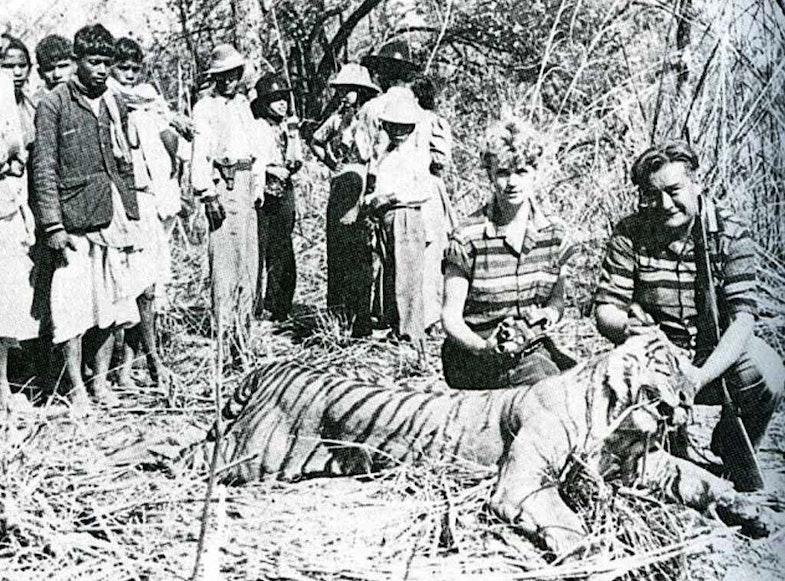
Boris with wife Inger after killing tiger in Chitwan
Your mother’s mother and your father’s mother also lived here, right?
My mother’s mother was very strong. She had a ‘Viking spirit.’ She would harass all the staff at the Royal Hotel. She would always check up on things suddenly. If there was any mistake in the kitchen or the cleanliness, she would scold the staff severely. They would tremble when they heard the name Mrs Scott. She was in charge of the hotel’s management.
There is a story that a new car had to be bought for the hotel. Since buying a car here would be expensive, Boris decided to go to England and bring a Land Rover. You probably went with the family. From there, you came all the way to Nepal by car…
When my father came to Nepal for the first time, we children did not come. The second time, about two years later, I was about 12 years old, and my brothers were 11 and 9 years old. We brought two Land Rovers from England. One Land Rover towed a 22-foot-long aluminum-covered caravan. Inside that, there were four bunk beds. There was a room for my parents, a bed, a small kitchen, and a toilet. The Land Rover driven by my father towed that caravan. It took about four months to reach Nepal from England.
That caravan was brought to start the overland tour. My father’s idea was to start luxury tours. The idea was to bring a chef and a bartender and conduct very high-class luxury overland tours. After that, the tours started, including the overland tours.
Boris had a lot of dynamism; his mind worked very fast, and he was extremely active. In the Western media, it was said that there were only two things worth seeing in Nepal: Mount Everest and meeting Boris, right?
His own history was so interesting. If someone needed information, people would say that Boris could somehow get that information. If someone needed to meet someone, he could arrange the meeting. The main thing is that his energy and dynamism were such that people even wrote ‘Mount Everest and Boris.’ It’s a bit difficult to go to Mount Everest, but it’s easy to go to Boris’s apartment.
When Prince Philip came to Nepal, he reportedly asked, ‘Are you Boris?’ He had already read about Boris, right?
They also knew that Boris would host the Royal Visit. There is a story about that. When she met Queen Elizabeth, she would not shake hands with anyone; she would ‘bow.’ As they were leaving Kathmandu Airport, there was a line of people saying goodbye. My father was also standing in the line. When she came near my father, Queen Elizabeth extended her hand, and my father held her hand and kissed it. Queen Elizabeth had never offered her hand to anyone like that. They appreciated my father that much.
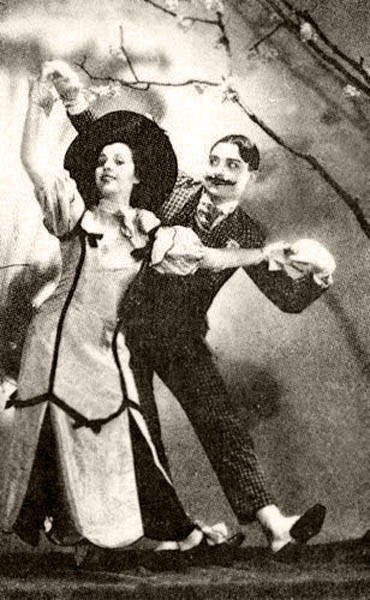
Boris with first wife Kira
When and why did the Royal Hotel, which holds such history, close?
It closed in perhaps 1969 or 70. I got married in 1968, and we also lived in the hotel for about a year after the wedding.
My father would never talk about private things, difficult things. He would try to solve that problem by keeping it inside himself. I had a very open relationship with my mother. I could tell my mother all my secrets. I wanted to introduce all my girlfriends. That did not happen with my father. Later, I asked my mother why my father wasn’t open. My mother said that the situation during the Russian Revolution was very terrifying. Boris’s entire family, all his brothers, were killed. Boris’s father also died on the way while fleeing. Perhaps that’s why my father kept all his sorrow inside his heart. He would ‘celebrate’ happy things but not talk about sad things.
I don’t know the detailed reason why we had to leave Bahadur Bhawan. I know my father said, “Our agreement is finished.” That property later became the government’s. After that, he opened the Yak & Yeti Restaurant in Lal Durbar. The Yak & Yeti Bar had a copper ‘fireplace,’ designed by my mother. We brought that fireplace and opened the Yak & Yeti Restaurant in Lal Durbar.
Did your mother do the interior decoration of the restaurant?
My mother designed everything herself. She was also an artist. She did good ‘oil paintings.’ Later, she even held an exhibition. There was also an exhibition in Denmark. My mother had a designer’s eye.
It’s been a long time since I went to the Yak & Yeti Hotel. That chimney is still there, and the decoration hasn’t changed much.
How many years did you run that restaurant before moving on to the hotel?
It wasn’t many; after running it for three or four years, we were in a position to start the Yak & Yeti Hotel. The World Bank had come to Nepal. Based on Boris’s name and reputation, they agreed to provide a loan. Radhe Shyam Saraf suggested we do it together. So, my father started building the hotel with him.
There are two stories about this. According to one story, my father was cheated by his partner. The partner did not prepare the documents as per the agreement, and my father got angry and broke the agreement.
The other story is that the World Bank would give a large loan according to the agreement. The agreement was that the partner would contribute this much, and my father would contribute that much. My father could not deposit the stipulated amount. For that reason, the partner created a different kind of agreement. When that agreement was read out in the meeting, my father got extremely angry, abruptly stood up, and walked out.
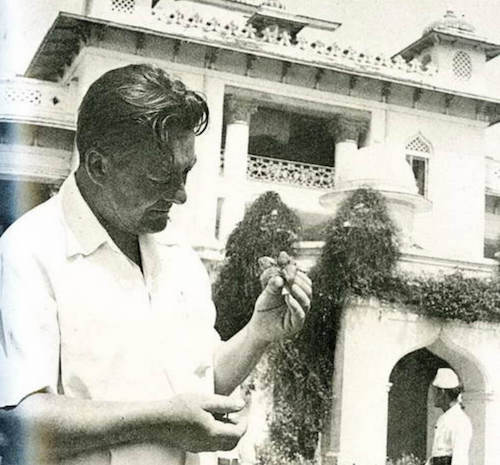
Boris at the Royal Hotel in Kantipath, established in 1955. Boris opened this hotel in partnership with Prince Bashundhara
I think the second story is true.
For many years, I was angry with my father’s partner. But later, a very close friend of mine told me the second story. He knew both the partner and my father. After he told me that story, I said, “That could be it.”
But the problem with this was that when my father left that agreement, the Yak & Yeti Restaurant was also merged into the hotel. It was no longer ours, and we had to leave that place. After that, I thought, Now I have to do something quickly. My parents went to Europe to raise money. By the time they returned, I had already prepared a restaurant in Battisputali, Boris Restaurant.
Your mother mentioned somewhere that Boris cried a lot when King Tribhuvan died!
Yes, they were good friends. King Tribhuvan would drive alone to the Royal Hotel at 11 or 12 at night. He would sit with my father upstairs, drink whiskey, and talk. Tribhuvan’s death caused my father a lot of grief.
Your mother, who was of Danish origin and later became a Nepali citizen, how did she help Boris expand his business?
For most of the time, my mother had to look after us three brothers. She also had a lot of fun. Many people came to the bar and the apartment. Because of this, my mother had to be like a ‘hostess.’
My grandmother (my mother’s mother) provided my father with financial support. My father was very talented at starting new projects, but once a job started and began running well, his interest would wane. Therefore, he never made money himself; others would benefit from those projects.
Aren’t you also like your father? You ran many restaurants. Then you went traveling again. You also have a very carefree nature.
Yes, but I was not as famous as my father. My restaurant and spiritual life ran parallel. For example, when I was with Guru Rajneesh, I had a restaurant in Thamel, Sangha Mitra Restaurant and Guest House. After he passed away, I went to Pune and opened a Sangha Mitra Restaurant there too. Later, I went to Goa and opened a restaurant with the same name there as well.
When I ran Boris Restaurant, I was a Rajneesh devotee and only wore orange clothes. I wore a garland with Rajneesh’s picture.
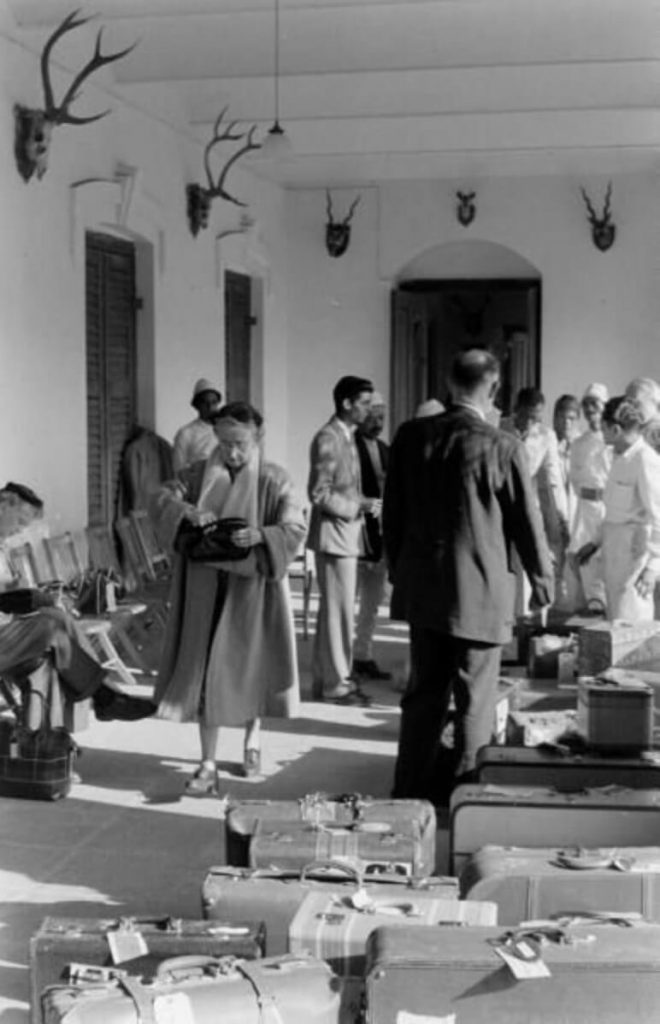
Tourists arriving at the Royal Hotel on March 16, 1955
And after that, your father was not happy with you, right?
He could not understand why I needed this (Rajneesh). Although he didn’t say much, I knew he didn’t like it. I couldn’t explain it to him either. My mother understood my feelings from the beginning and always supported me. I used to give my mother books too. My mother liked Osho’s discourses and ‘talks.’
Where were you when your father passed away?
When I was in Rajneeshpuram in Oregon, America, I received the news that my father was in the hospital, and his condition was very serious.
We went straight from the airport to Bir Hospital. My father was in a ‘coma,’ but he felt something when I held his hand. His heartbeat was still there. He passed away about two hours later.
Boris’s great-grandfather was a lieutenant general in the Russian army. He turned back from the middle of the road while going to fight with Napoleon. Tell us about that.
He fought one battle, though. I think he won the battle. His portrait is still kept in the Saint Petersburg Museum.
People from such a family—and Boris took his last breath on a normal bed at Bir Hospital after coming to a country like Nepal. Both of your grandmothers also passed away in Nepal.
Yes. Both my mother’s mother and my father’s mother. One brother also passed away in Nepal.
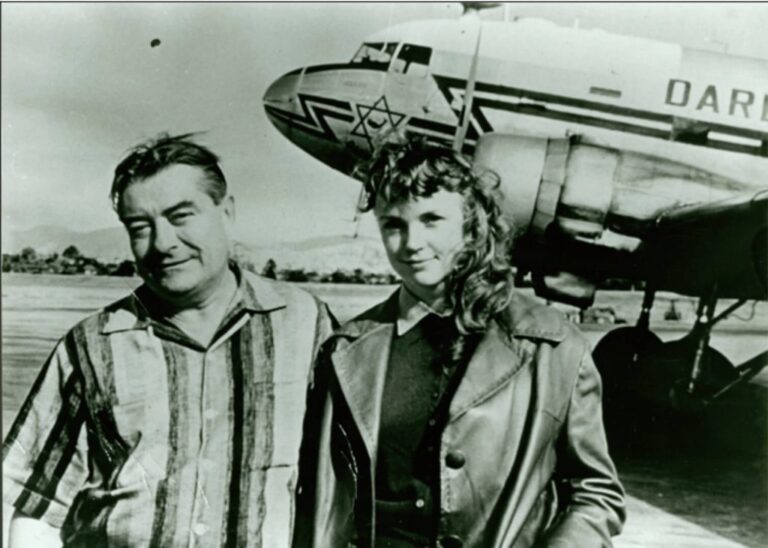
Boris with his second wife Inger at Kathmandu airport in 1955
How do you feel when you think about how someone from one place came and ended their life in another place?
Who knows what happens after this? Death is ahead for everyone, no matter where they are. Personally, when I look into my heart, Nepal feels like my home. Nepal is the home of my heart. I get a different feeling when I am with Nepali people.
My mother’s funeral was held at Pashupati Aryaghat. She was cremated according to Hindu rituals, right?
I lit the funeral pyre myself. I performed all the rituals of circling and lighting the fire.
You keep coming and going to Nepal. How long have you stayed this time?
It’s been about five months this time.
Then why are you leaving again?
Even though I have stayed in Nepal for so long, even though my father made such a huge contribution, and even though my mother had Nepali citizenship, I am only allowed to stay in Nepal for a total of five months a year. After that, I have to go to another country. As soon as the five months are over, I have to go to India. This has been going on for three or four years.
Do you want to live permanently in Nepal now?
I want to live permanently in Nepal.
Where?
I am happier in Chitwan than in Kathmandu. A very close, old friend of mine has opened a resort in Chitwan. I am helping him with food & beverage and marketing there.
Your mother had Nepali citizenship. Did your father not have it?
My father had a British Subject passport.
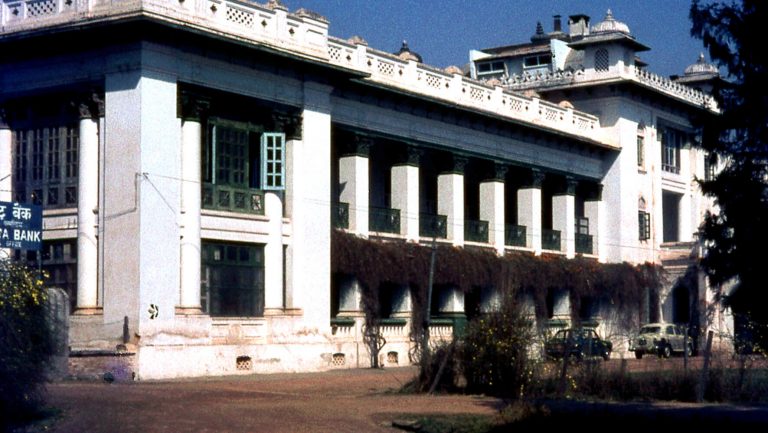
The Royal Hotel, which closed in 1969. Photo: Andrew Hall
Did you not try to get citizenship based on your mother’s name?
Well, that rule has just been introduced recently. I am understanding the process; I am also consulting with a friend about how I can stay legally.
Boris, you and other members of your family have made such a huge contribution to Nepal. Doesn’t it annoy you to face visa problems?
I also can’t understand why this isn’t done, why there is no respect. It is not a big thing to arrange permanent residency for me. I haven’t come to Nepal to steal money. I also spend money here. It seems strange why they won’t let me stay. I’m already old; show an old man a little love!
What is your real name?
Mikhail in Russian. Michael in English. Michael is also on my passport.
And, Miska?
That was the name my parents gave me when I was little. It was Miska until I met Rajneesh.
After Miska, you became Devdarshan?
The name Devdarshan was given by Rajneesh. Guru Papaji said not Devdarshan, but Atmadarshan. Later, he said, Now not Atmadarshan, but Sudarshan. But for simplicity, I have only kept Darshan.
You saw your parents’ struggles. You have reached this point with your own experiences. If you had to say it in two sentences, what is life?
I can say it in one sentence: Life is the present, which does not need to be explained.
From this moment, there is only this moment again. To say the past or the future, both are only the present. We must be able to enjoy this moment. We must thank the universe, thank God, for everything we have received in life.
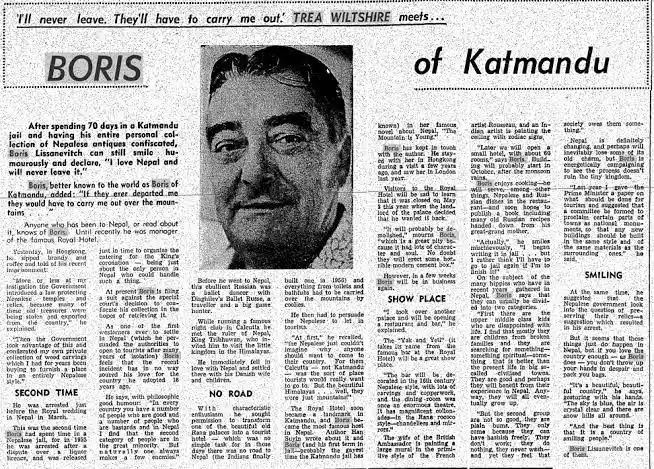
Article published in an international magazine about Boris. Boris was known in the international community as ‘Boris of Kathmandu’